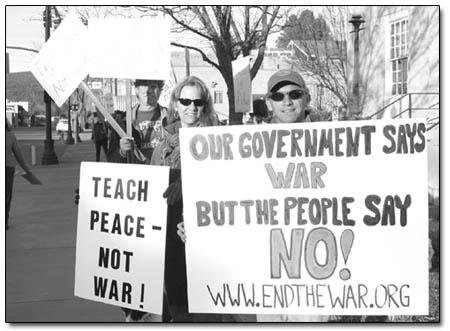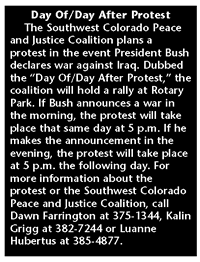 |
| Mary Duemetria and Greg Rossell,
both of Durango, hold signs during a peace vigil organized
by the Southwest Colorado Peace and Justice Coalition last
week. The group holds weekly vigils to protest possible
war in Iraq./Photo by Todd Newcomer. |
As the drumbeats of impending war between
the United States and Iraq grow louder, many Durangoans have
joined the anti-war opposition resonating throughout the nation,
hopeful that their messages of peace and justice will thwart
what they believe is tasteless imperialism.
On Friday, nearly 80 people gathered on Durango’s Main
Avenue for a peace vigil protesting any U.S.-led aggression
against the Middle Eastern country. Participants walked Main,
toting signs of expression and candles, gently voicing their
views to passersby. Then, Saturday morning about 50 Durangoans
caravanned to Kirtland Air Force Base in Albuquerque, where
they joined thousands of others – as well as hundreds
of thousands more across the nation – to insist that President
Bush and his administration choose not to take a preemptive
strike against Iraq in the name of national security.
 National
groups organized last week’s protest in larger cities,
which helped them garner the most media attention. But local
efforts by the Durango-based Southwest Colorado Peace and Justice
Coalition have begun to create a tide of grassroots democracy,
which the coalition’s organizers say is critical.
National
groups organized last week’s protest in larger cities,
which helped them garner the most media attention. But local
efforts by the Durango-based Southwest Colorado Peace and Justice
Coalition have begun to create a tide of grassroots democracy,
which the coalition’s organizers say is critical.
The coalition formed in October, soon after a local rally against
the invasion of Iraq drew about 300 participants. Impressed
by the turnout, rally organizers received feedback from residents
who wanted more than a one-time event.
“People really had the energy and interest in keeping
the issue out there locally,” says Dawn Farrington, a
coalition founder.
The coalition now holds weekly meetings and peace vigils. While
the coalition has expanded its focus to also include issues
such as justice, community and education, its immediate goal
is to increase awareness about the impending war. Like others
in the nation, the timing of the reaction is strategic, given
the escalation of military preparations and troop deployments
in recent weeks. It also is in response to the scheduled Jan.
27 deadline for the first major report by U.N. Security Council
weapons inspectors.
“The strategy is to mobilize public opinion against (the
war), assuming that the democratic process is in place,”
says Kalin Grigg, also a coalition founder. “There is
a huge amount of public doubt in the case the Bush administration
has made for this war.”
National surveys, especially in recent weeks, show that the
majority of Americans support Bush’s leadership in spite
of the unsettling prospect of war. But vociferous opponents
believe there is still time to find a peaceful resolution, particularly
since they believe the administration has failed to provide
clear and compelling evidence for war. Though Durango is halfway
around the world from Iraq, Grigg and Farrington believe that
their efforts have a deep impact.
Grigg says it helps to have people find a common viewpoint
and collective voice on issues that could have local consequences.
“A sense of solidarity and community is profoundly important
to people,” Grigg adds.
If the United States does engage in a full-scale war against
Iraq, both Farrington and Grigg believe the most noticeable
effect will be on Durango’s economy.
“The Durango economy is shaky as a reflection of the
national economy,” says Grigg. “Tourism is our cream
on the gallon of milk. People travel when they have discretionary
income. Without that income, people won’t go places and
spend money.”
To boot, says Farrington, small businesses will find it increasingly
difficult to remain solvent and sustain the local labor force.
Add to that the already devastating budget cuts affecting social
and human services.
“People at the bottom will see this the most,”
she says. “The poor won’t stay so hidden.”
Media accounts and historians say the organized opposition
to this war is as strong as the opposition to the Vietnam War
at the same stage of the game. And if Bush does declare war,
the Southwest Colorado Peace Coalition plans only to create
louder opposition and local action.
In February, coalition members will be part of a mass rally
in Aspen during the ESPN X-Games. The Colorado Coalition Against
War in Iraq – the first-ever statewide group formed to
oppose a war – is sponsoring the rally. The local Peace
Coalition has become part of this larger group under the theory
of strength in numbers, says Farrington.
By the same token, protesters joined forces in Albuquerque
to create a greater showing in one place, which they hope made
a stronger statement. It also provided a chance for those who
support the cause to unite.
“There’s more networking going on 85 before the
escalation of (war),” she says.
That’s partly due to e-mail and the Internet, which the
coalition uses to boost its causes, particularly since Grigg
says the anti-war movement “gets very little thoughtful
coverage in the mainstream media.”
Yet Farrington says it’s tough to convince people to
scrutinize the subject with awareness and compassion.
“In a time of patriotic fervor, it’s hard for people
to look at the issue,” she says. “But working on
a local level gives you a feeling that you aren’t completely
powerless.”
Most Durangoans protesting the impending war also have a global
conscience. Jess Schlam, a Fort Lewis College student who participated
in last week’s downtown vigil, says his participation
may not affect more than five people, but those five people
may affect another five people, therefore creating a swell of
interest.
“I came to get the point across to others and help them
realize that you can’t go around bombing peaceful nations,”
Schlam says. “This is another form of news, especially
the kind of news that doesn’t get censored as closely.”
Trekking behind Schlam were John and Eliane Viner. This was
the first time the Viner had participated in the local peace
vigil, but they have opposed war in the past, particularly Vietnam.
Eliane says she has a personal disdain for war because she grew
up in wartime Germany. John adds a more political aspect.
“No one elected Bush to be dictator of the world,”
he says. “With the bellicose language of the president,
what this does is spawn terrorism. His policy is counterproductive
to his stated goals.”
Luanne Hubertus, who coordinates the coalition’s Friday
peace vigils and traveled to the Albuquerque rally, says it’s
important to continue with local opposition because Americans
need to be awakened and educated about what’s at stake
– whether they support war or not. No effort is too small,
she says.
“Will we stop the war? I really hope so,” she says.
“Everything is a drop in the bucket.”

